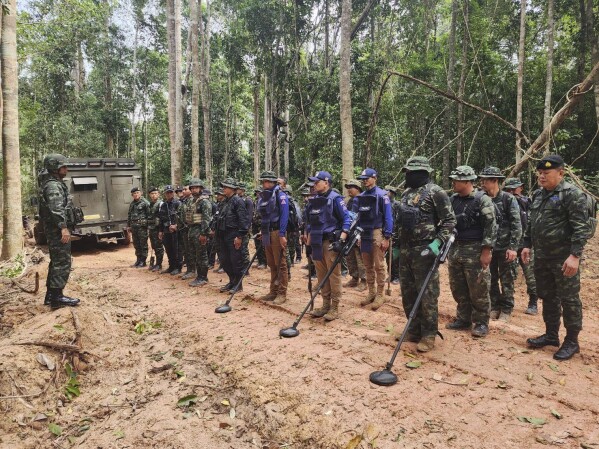Thailand on Wednesday ordered the closure of several border crossings with Cambodia, expelled the Cambodian ambassador, and recalled its own envoy from Phnom Penh after a Thai soldier was maimed by a landmine in a contested border area.
The Thai Army said five soldiers were injured in the incident when one stepped on a mine and lost his leg. It came just a week after a similar blast wounded three other Thai troops in a different disputed section of the frontier.
Acting Prime Minister Phumtham Wechayachai called the incident unacceptable, announcing that the Foreign Ministry would lodge an official protest and consider further measures.
The army claimed the mines had been newly planted along paths designated by mutual agreement as safe and said they were of Russian origin, not used by Thai forces.
“The Cambodian side must take responsibility for this incident, which threatens peace and stability along our shared border,” the army said in a statement.
Cambodia rejected the accusation as “baseless,” with Defense Ministry spokesperson Lt. Gen. Maly Socheata insisting the blast occurred inside Cambodian territory and accusing Thai forces of violating a 2000 accord on patrol routes.
Tensions between the neighbors have simmered for weeks, following a deadly skirmish on May 28 in which one Cambodian soldier was killed. Many of the small border checkpoints had already been operating with restrictions amid the flare-up.
Nationalist sentiment has complicated efforts to de-escalate the situation, fueled in part by political fallout in Thailand. Last month, former Prime Minister Paetongtarn Shinawatra was suspended from office after a leaked call with former Cambodian leader Hun Sen, in which she was accused of disparaging her own military.
Cambodia denied planting new mines, noting that decades of civil war have left much of its countryside littered with unexploded ordnance.
Since 1998, nearly 20,000 Cambodians have died and over 45,000 have been injured by mines and other explosives. Last year, casualties fell to 49 deaths nationwide.
Both sides have signaled the dispute is unlikely to resolve soon, as each insists the other is responsible for the rising tensions along the heavily mined and historically contested frontier.

